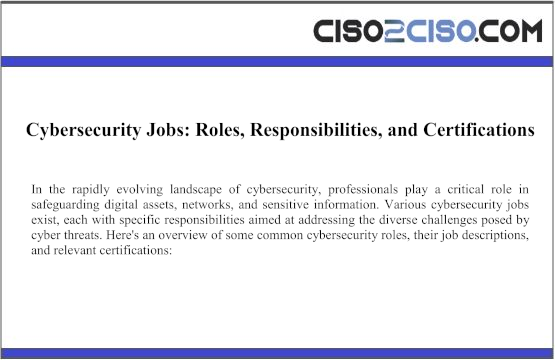In the rapidly evolving landscape of cybersecurity, professionals play a crucial role in safeguarding digital assets, networks, and sensitive information. The document outlines various cybersecurity roles, each with specific responsibilities aimed at addressing the diverse challenges posed by cyber threats.
- Security Analyst: Security Analysts are responsible for monitoring and analyzing security alerts, investigating security incidents and breaches, implementing and managing security solutions, as well as conducting risk and vulnerability assessments. Recommended certifications include CompTIA Security+ and Certified Information Systems Security Professional (CISSP).
- Incident Responder: Incident Responders are tasked with responding to and investigating security incidents, developing and implementing incident response plans, conducting post-incident analysis, and collaborating with relevant teams for remediation. Certifications suggested are Certified Incident Handler (GCIH) and Certified Information Systems Security Professional (CISSP).
- Penetration Tester (Ethical Hacker): Penetration Testers, also known as Ethical Hackers, conduct security assessments to identify vulnerabilities, perform penetration testing on networks, systems, and applications, and provide recommendations for securing identified weaknesses. Recommended certifications include Certified Ethical Hacker (CEH) and Offensive Security Certified Professional (OSCP).
- Security Engineer: Security Engineers design and implement security solutions and infrastructure, configure and manage security tools and technologies, monitor and analyze security metrics, and provide technical support for security issues. Certifications suggested are Certified Information Systems Security Professional (CISSP) and Certified Information Security Manager (CISM).
- Security Consultant: Security Consultants advise clients on cybersecurity strategies and best practices, conduct risk assessments and security audits, develop and deliver cybersecurity training, and assist in incident response and recovery. Recommended certifications include CISSP and CISM.
- Security Architect: Security Architects design and create secure systems and architectures, evaluate and recommend security technologies, develop security policies and procedures, and collaborate with development teams on secure coding. Certifications suggested are CISSP and CISM.
- Security Operations Manager: Security Operations Managers oversee and manage security operations teams, develop and implement security policies and procedures, coordinate incident response efforts, and monitor and report on security metrics and incidents.
- Cybersecurity Analyst: Cybersecurity Analysts analyze and interpret cyber threat intelligence, monitor and analyze security logs and alerts, investigate and respond to security incidents, and implement and enforce security policies. Certifications recommended are CompTIA Security+ and CISSP.
- Security Compliance Analyst: Security Compliance Analysts ensure compliance with industry regulations and standards, conduct compliance audits and assessments, develop and maintain compliance documentation, and assist in responding to regulatory inquiries. Certifications suggested include Certified Information Systems Auditor (CISA) and Certified in Risk and Information Systems Control (CRISC).
- Security Software Developer: Security Software Developers develop secure software applications and tools, implement security features within software code, conduct code reviews to identify security flaws, and stay current with secure coding practices. Certifications recommended are Certified Secure Software Lifecycle Professional (CSSLP) and Offensive Security Certified Professional (OSCP).
- Cybersecurity Trainer: Cybersecurity Trainers develop and deliver cybersecurity training programs, educate employees on security best practices, conduct simulated security exercises and drills, and stay updated on the latest cybersecurity trends. Certifications suggested include CISSP and CompTIA Security+.
Overall, this document provides a comprehensive overview of common cybersecurity roles, their job descriptions, and relevant certifications, offering valuable insights for individuals looking to pursue a career in cybersecurity or advance in the field. By understanding the responsibilities associated with each role and obtaining the recommended certifications, professionals can enhance their knowledge and skills to effectively combat cyber threats and contribute to the security of digital assets and information.
Views: 11




















































